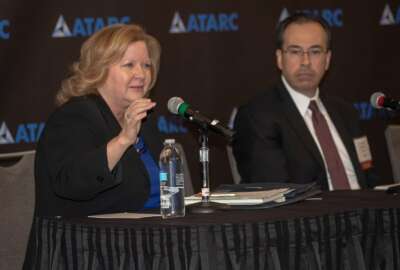
TSP considering fixed 2% COLA for annuity recipients
In today's Federal Newscast, the Thrift Savings Plan wants to change the rate it currently uses to calculate some annual cost of living adjustments.
To listen to the Federal Newscast on your phone or mobile device, subscribe in PodcastOne or Apple Podcasts. The best listening experience on desktop can be found using Chrome, Firefox or Safari.
- The Thrift Savings Plan wants to change the rate it currently uses to calculate some annual cost of living adjustments. The TSP is proposing a new rate fixed at 2% a year. TSP participants who have separated from federal service can currently take an annuity with an increasing payment option. That option is currently based on the annual cost-of-living adjustment calculation. These COLAs vary each year and are based on the annual change in inflation. But the increases can’t exceed 3% a year. The TSP says moving to a fixed rate would give its participants a more predictable pattern of income. (Federal Register)
- The Senate passed two minibus spending bills and a 3.1% pay raise for federal employees. Both bills now head to the president’s desk for his signature. They avoid a second government shutdown for the year, and secure nearly $1.4 trillion in funding for agencies for the rest of 2020. The 3.1% pay raise won’t go into effect until the first pay period of the new year. President Trump must sign an executive order to make the raise official and adjust locality pay rates. (Federal News Network)
- The two minibus spending bills are silent on funding for the Bureau of Land Management’s relocation to Colorado and other western states. Lawmakers say they still haven’t received enough information or justification for the move. Members instead are asking Interior to give appropriators monthly briefings on the status of the relocation. The spending bills also remind agencies, they can’t move, transfer or relocate any employees, offices or programs without permission from Congress. (Federal News Network)
- The defense policy bill signed into law by President Donald Trump has some benefits for new parents. New mothers in the Marine Corps and Army now have an opportunity to defer deployment if they want. The 2020 defense authorization act, signed into law this week, allows new mothers to defer deployment up to a year after giving birth. The Navy and Air Force already have a deferment policy in place. Mothers must get the approval of a health care provider in order to use the benefit. The military reserves the right to deploy the mother if the assignment is in the interest of national security. The benefit may help the military retain mid-career women, which is a demographic that the services are trying to hold on to.
- Maj. Gen. Robin Fontes has taken over as deputy commanding general for operations of U.S. Army Cyber Command. Brigadier General Richard Angle formerly held the position. Fontes graduated from West Point in 1986. She most recently served as the senior defense official and defense attaché to India. She also was the director for strategy, plans and policy for the Army deputy chief of staff for operations. (U.S. Army Cyber Command)
- President Trump has a new permanent director in mind for the National Science Foundation. He intends to nominate Sethuraman Panchanathan executive vice president and chief research and innovation officer at Arizona State University. Panchanathan would replace France Córdova, after her six-year term expires. U.S. Chief Technology Officer Michael Kratsios, and Director of the White House Office of Science and Technology Policy Kelvin Droegemeier said Panchanathan would play a key role in advancing federal research and development efforts. (White House)
- Two more federal technology executives are on the move. Margie Graves, the deputy federal chief information officer, is leaving on Dec. 31. Graves will move into the private sector, but says she is unsure what her plans are at this time. She has been the federal deputy CIO since March 2016 and has worked in government for 18 years. Meanwhile over at the Securities and Exchange Commission, Dave Bottom is the new CIO, coming over from the DHS Office of Intelligence and Analysis. He replaces Pam Dyson, who left in September 2018. (Federal News Network)
- The Data.gov portal is getting a facelift. The General Services Administration hired REI Systems under a three-year contract to continue to develop and modernize the 10-year-old repository. Data dot gov has grown to over 200,000 datasets from hundreds of data sources including federal agencies, states, counties, and cities. REI Systems will work across four tasks areas under the contract, including deploying new capabilities and managing the open source code that the portal runs on. (REI Systems)
- Senators Gary Peters (D-Mich.) and Joni Ernst (R-Iowa) have introduced a bill to help small businesses break into the federal marketplace. The Promoting Rigorous and Innovative Cost Efficiencies for Federal Procurement and Acquisitions, or PRICE Act, would require the Office of Management and Budget to work with agency acquisition administrators to share best practices, on getting small businesses to compete for government contracts. Peters said the bill would also help increase participation from veteran- and women-owned small businesses. (Senate Homeland Security and Governmental Affairs Committee)
- Three agencies have gotten together to make sure patent holders get protection against infringement. The Justice Department, the National Institute of Standards and Technology, and the U.S. Patent and Trademark Office update policy for when holders have agreed to license their patents on fair and non-discriminatory terms, and still are hit with infringement. The new policy says that when negotiations fail and their patents are infringed upon, holders can get remedies, including injunctive relief. Justice had withdrawn from the 2013 joint policy, which was fuzzier on injunctive relief. (Department of Justice)
Copyright © 2024 Federal News Network. All rights reserved. This website is not intended for users located within the European Economic Area.
Eric White
Eric White is news anchor and Federal Drive producer at Federal News Network.
Follow @FEDERALNEWSCAST
Related Stories
Related Topics
All News
BLM relocation
Bureau of Land Management
cost of living adjustment
Data.gov
Dave Bottom
Federal Drive
Federal Newscast
Gary Peters
General Services Administration
government shutdown
Joni Ernst
Justice Department
Margie Graves
National Institute of Standards and Technology
Patent and Trademark Office
Pay & Benefits
Retirement
Robin Fontes
Sethuraman Panchanathan
TSP
Workforce





